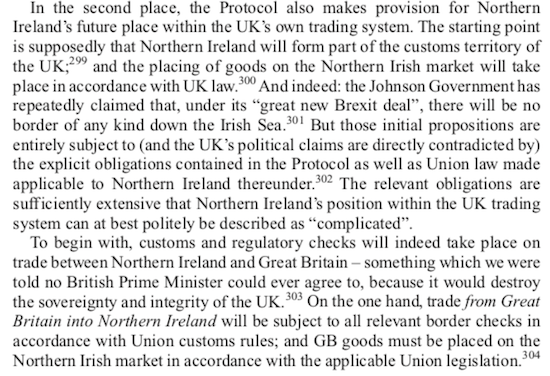
Lots of requests for a "step-by-step" guide to where we are with the EU-UK negotiations.
So here you go - short thread summarising the essential context & key points / issues:
So here you go - short thread summarising the essential context & key points / issues:
1) UK formally left EU in January 2020 but entered a "transition period" during which nothing very much changed: meant to give time for negotiations over future EU-UK relationship in fields like trade and security; based on "Political Declaration" as agreed by Johnson Government
2) Political Declaration envisaged only distant EU-UK relationship: partly logical consequence of Theresa May's longstanding "red lines" on free movement etc; but also result of renewed political preference, by Johnson Government, for even more extreme "clean break Brexit"
3) But almost immediately after UK withdrawal, Johnson Government changed the goalposts in ways that can only be described as cynical, untrustworthy and reckless. Started by tearing up large parts of Political Declaration: even its distant ties were no longer distant enough...
4) ... & continued with new red lines / fresh demands reflecting Johnson's (frankly tedious) belief that UK should "have its cake and eat it". So: back to square one - yet UK refused extension to transition period, to give more time for negotiations - even after onset of pandemic
5) ... & further problems arose after Johnson's direct and explicit plans to breach the agreement, already reached with the EU, for managing the border between Ireland and Northern Ireland. Widely regarded as dangerous attempt to use stability / peace in NI as leverage in talks.
6) Against that messy backdrop, talks have gotten bogged down in series of specific issues. Important to stress: none of these are at all new; it's been like this, again and again and again, for many months already! 3 issues have proved particularly difficult.
7) First, the level playing field, ie guarantees that UK will not engage in unfair competition, by slashing standards in fields like state subsidies, employment, environment etc. EU says they are essential. UK says "just trust us, we won't do it". EU wants it more concrete thanks
8) Secondly, governance and dispute settlement, ie how to manage relations and put things right when they go wrong. EU wants power of rapid response if UK breaches obligations - hardly surprising, especially given Johnson's breach of NI agreement just months after signing it...
9) Thirdly, fisheries: EU wants stable agreement on access by EU fleets to UK waters, directly linked to terms for access by UK suppliers to latter's primary market, ie the EU itself. As we know: an issue whose political profile vastly outweighs its relative economic importance.
10) But beyond those specific points of disagreement, there's a more fundamental problem at work here. Put simply: UK just hasn't accepted consequences of its own choices. Johnson says "we've taken back control, now treat us as your sovereign equal". Whereas the EU replies:
11) In reality, the UK has given up control. It gave up its leadership in Europe to become a 3rd country. Now it has to strike bargains with the rest of the world: not just other mid-ranking powers; but also the superpowers & regional blocs. Which means compromises & obligations.
12) Even on most optimistic scenario, ie deal done & ready to apply from 1 Jan 2021, it would be so narrow and shallow that - for many purposes / sectors / actors - it would be virtually indistinguishable from having no deal at all. But that was always Johnson's clear preference
13) If there is no deal: in 2021 the UK will finally experience what it really means to have left the EU - and do so at the same time as we struggle also with the ongoing pandemic health & economic crisis. But again that would be the direct result of deliberate choices by Johnson
14) I don't subscribe to the "armageddon's coming" view of January 2021. We'll see how bad the short term disruption is. But in reality, Brexit will be a slow and painful maiming by many wounds: m/b-illions of increased costs, extra burdens, lost opportunities, frustrated hopes.
15) Even if a better deal comes along in due course, it will only mean costly & disruptive "two regulatory changes" that transition was designed to avoid. And of course: nothing can undo the damage Brexit & Tories have already done to the UK's reputation and fundamental interests
• • •
Missing some Tweet in this thread? You can try to
force a refresh




